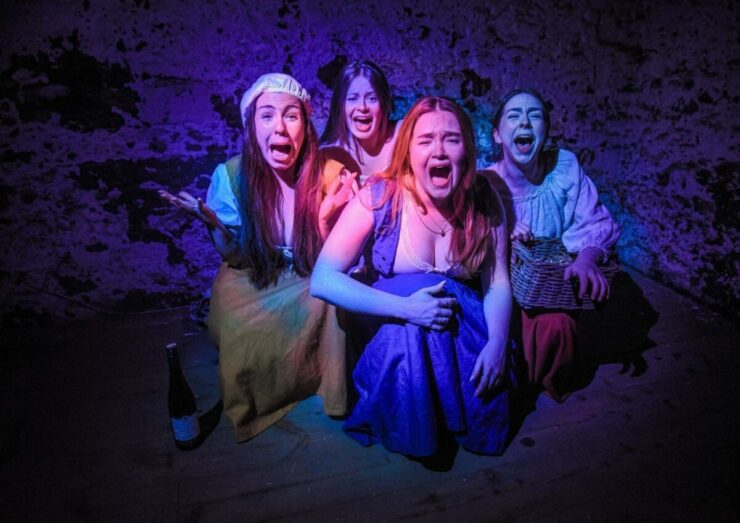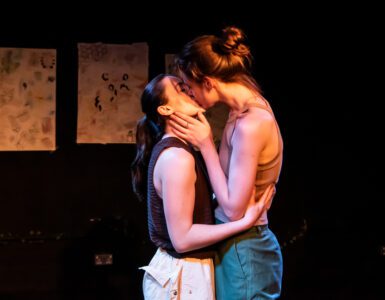“I am a sick woman, there is no other path.”
This is not the first show to discuss the tragic plight of mad women, and it will certainly not be the last. But in the compact intimacy of the Olive Studio and with a mere fifty minute runtime and a hell of a lot of information to pack in, koi collective’s Hysterical manages to be fierce, fresh, and full of feeling, with characters so much larger than life it’s hard to believe they’ve been dead so long.
Firstly, Sally MacAlister’s script is gorgeous. The language is poetic without sounding forced, moving back and forth between the six-strong ensemble with both easy musicality and the speed and precision of a match on Centre Court, and the women of Hysterical are familiar, perhaps even archetypal, but never stereotypical. The dialogue flows nicely, with nothing rushed despite urgently repeated reminders of the show’s limited runtime. While the performance takes on a format we are certainly familiar with in terms of retelling the lives and tragedies of historical women, the dialogue feels natural and refreshing, and there is a constant awareness of where and when the story is taking place, not least thanks to amusing fourth wall breaks alluding to just about every emerging theatre company’s classic Fringe experiences – a smoke machine? In this economy?
Throughout Hysterical, we move through the lives, loves, and losses of Catherine, Mercy, Augustine, Celia, and Anne, with guarded history teacher come unwilling audience participant Jenny looking on. Each cast member performs fantastically both as the tragic heroines of their own stories and as a member of the wider ensemble. I was pleasantly unsurprised to hear that this had been a self-directed endeavour, with responsibility for direction of the piece taken on collaboratively by its cast. Every aspect of the performance, from mood to movement to music, feels cohesive and intentional. It’s clear each movement has been choreographed with a clear understanding and intention as to why it is being included. It is clear each cast member loves their character dearly, and has endeavoured to know her as intimately and fully as possible.
As Hysterical gives each of its cast a moment to shine, so I intend to do the same in this review. Jess Ferrier is fierce and captivating as Catherine, condemned as a witch for reading. Her story draws us in immediately, and following its completion, Ferrier’s energy and comic timing never wavers as part of the ensemble for the remaining stories, with her performance as Augustine’s rather Austenesque mother being a highlight for me. In contrast to Catherine’s fiery defiance is Mercy, played endearingly by Evie Mortimer. “A mercy it was to take me in, so Mercy I became,” Mercy tells us, remaining steadfast and kind even in the face of abject neglect from the foundling hospital where she is raised. In the quiet tragedy of Mercy’s story, Mortimer’s wonderful singing and earnest empathy for all who have failed her are both hopeful and heartbreaking.
To me, the standout emotional performance comes from Georgia-Lee Roberts in the role of Augustine. Informed by the life of Louise Augustine Gleizes (b. 1861), Augustine’s story is perhaps one of the most harrowing to listen to, perhaps because of how desperately she tries to change her own narrative, only to be reminded, gently but firmly, that you cannot rewrite a book already finished. Rather, as she tells Jenny later, you can only read the line exactly as it’s written. Roberts is a comic firecracker from the moment she steps onstage. vivacious and bombastic, which makes her descent into despair and likely destitution feel like even more of a sledgehammer to the sternum. It is genuinely heartbreaking to watch her fight in vain to change even one detail of her story – not to alter the ending, but just to give herself a voice for one moment, to allow herself to scratch and bite and claw back some semblance of autonomy in the face of the exploitative and manipulative Dr. Charcot, who in real life publicly exhibited Gleizes’ “hysteria” to the likes of Sigmund Freud in order to boost his own standing and who, following this, went on to become known as “the Napoleon of the neuroses”, while Augustine, following her escape from solitary confinement in the Salpêtrière Hospital, was never seen again.
Zara Louise Kennedy provides an interesting change of tone as Celia, a woman who believes herself to be hysterical. Kennedy is very funny in her neurotic portrayal of a woman on the very edge of sanity, although not for any doctor-diagnosed symptom or accusation of witchcraft. No, Celia is simply an unhappily married woman who, thanks to the presence of one very dashing young soldier – played with deep unwillingness by a hesitant Jenny (Eilidh West) – has become somewhat… insatiable. While Celia’s story might seem comparatively satisfying in its ending, it provides an excellent well-roundedness to MacAlister’s roster of wronged women – despite her husband clearly being neglectful and apathetic, Celia at first believes herself to be the problem, even when emphatically told by a doctor that this simply isn’t the case.
After the relative lightheartedness of Celia’s tale, our time with Anne is sobering. Despite not having the opportunity to tell her story with the grandiosity of a Dolly Parton pastiche or the witty asides of a Greek chorus, Robyn Reilly’s performance is no less impactful – in fact, Anne’s simple act of dancing with her husband’s jumper is one of the most emotional moments in all of Hysterical. Reilly is also a strong comic performer, as evidenced from her expressive multi-roling in the ensemble.
Rounding off the cast is Eilidh West as Jenny. It’s not easy to play the unwilling ‘straight man’ against such larger-than-life characters, but West is very funny without having to say much, making us laugh as she oscillates from one bewildered facial expression to the next. She is also excellent at keeping us steady and grounded, offering calm sympathy to each of the women’s plights. Jenny’s role is to place these women in context, and West’s performance provides a wonderful emotional anchor.
The actors are complimented not only by a strong script, but by the lovely technical stylings of Lewis Gemmell. The shifts in lighting are seamless and natural, and the production utilises AV projection well. I will say that at times the music and sound, while very impressive, did overwhelm the actors’ voices, and I did miss some lines. Having said this, I loved the incorporation of the eerie vocalisations that echoed throughout the piece.
The ending of the show, while heartwarming and hopeful, does feel slightly abrupt, and if MacAlister and koi collective are to develop the show following their success here at the Fringe I would like to see more time devoted to Jenny’s emotional catharsis and the parallels between her and Anne’s lives and experiences. Despite being literally pulled up from the audience, at times Jenny felt the most distant from us, and it would be great to be able to break down that barrier a bit more going forward.
Overall, Hysterical packs one hell of a punch, and koi collective have established themselves a company to watch in the future. Each member of the cast proves themselves a valuable cog in a very well-oiled machine, and the company as a whole is a shining example of the power of collaborative direction. While this particular chapter of Hysterical has ended, I sincerely hope the end of their Fringe run will not signify the closing of the book for good – I think this show has excellent educational potential, as well as just being a brilliant laugh.
Hysterical in every sense of the word – koi collective’s production will certainly linger in your mind long after the ghosts have gone.
Recommended Drink: an Old Fashioned – sweet, bitter, and totally timeless.
Performances of Hysterical have now concluded at EdFringe 2024.
Hear the latest from Marginalised Voices from Fringes across the World
Subscribe to our Email Newsletter so we can send you insightful updates about unheard creative voices working to platform powerful stories. You'll be the first to hear about our content and how to apply to have shows you're working on reviewed.
Powered by EmailOctopus









